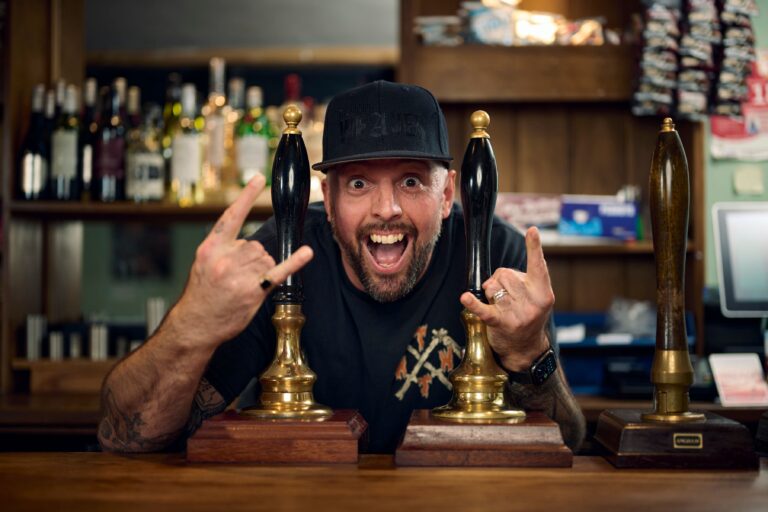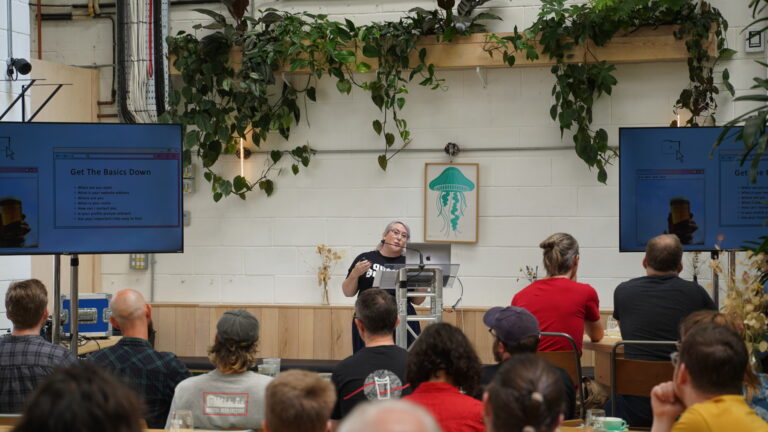Homebrewing so he and his university mates could drink cheap beer set Paul Harwood on a path of professional brewing. And some 10 years later, he’d open a brewery of his own. For that, beer fans in Birmingham are thankful.
Every county needs a great football team. Maybe more if they’re lucky. The West Midlands is blessed with Wolves and Aston Villa. Then there’s the others…
Every county also needs its fair share of great breweries, and thanks to Birmingham Brewing Company the good people of Stirchley and surrounding areas have been enjoying the excellent beers it has produced since 2016.
Founded by Paul Harwood, their mission was clear. That was to make great-tasting, distinctive beer using the best ingredients they could find and that means sourcing the best malt, hops, barley, oats and more to create the best beer for every beer fan for every occasion.
“I suppose we’re something of a proposition that sits between the real heavy craft breweries and also the mainstream outfits,” muses Harwood. “What’s important to us is offering independently-made, great beer that everyone can enjoy.”
A cursory glance at the brewery’s core ‘Brummie’ range demonstrates a selection that is likely to resonate with even the casual drinker. You have Pale, Gold, Bitter, Stout, Sober and Lager. And if you don’t like beer then there’s also Brummie Gin, which is distilled from the mash of its Pale brews.
“I remember starting out in 2016 knowing I wanted to do something really interesting with our house Pale. We used Belgian yeast with a nice dry hop. It was bold, estery, fruity,” he recalls. “But taking it out to market people simply told us they didn’t think it would sell. We went back to the drawing board with it. But I remain fond of that original recipe, even if others might not have been!”
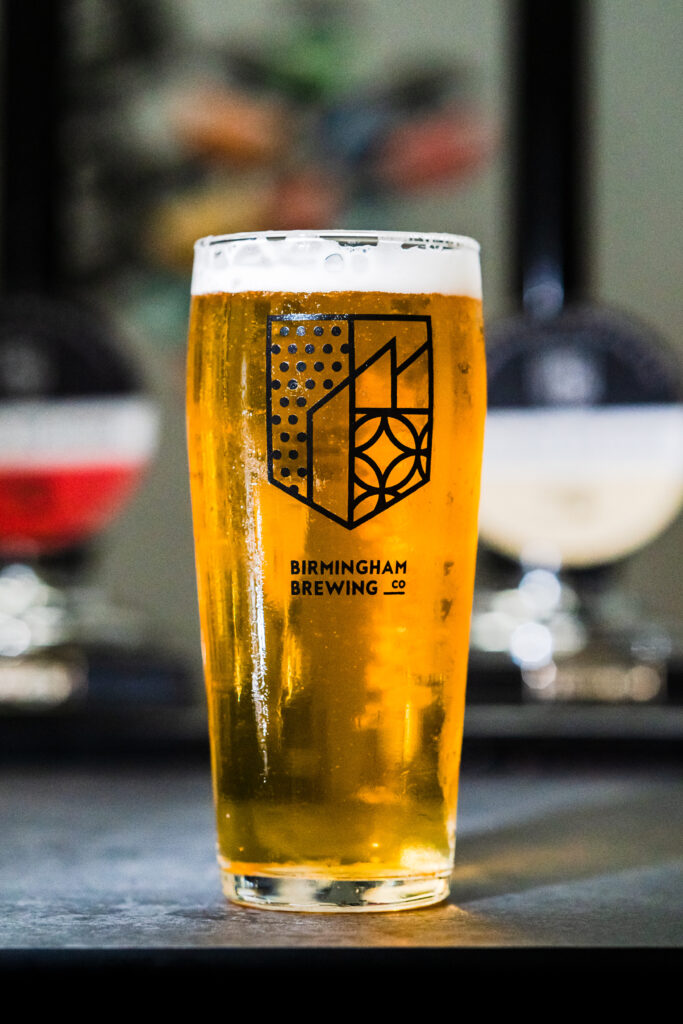
Bitter Brummie is a 4.1% classic British bitter brewed with caramel malts to bring a sweet malt flavour and a touch of liquorice, dry hopped with Centennial to add bitterness and notes of soft pine delivering an easy sipping bitter.
“I was a little inspired by Tiny Rebel’s Cwtch when it came to brewing this,” says Harwood. “It surprises a lot of people because Midland’s Bitter tends to be pale when this is more amber.”
Elsewhere in the range is Gold Brummie. A strong 5.5% IPA described as a collision of British bittering hops and American aroma hops that deliver lashings of resinous pine, grapefruit and a lingering bitterness all wrapped up in a spicy, voluptuous mouthfeel.
In addition to the non-alcoholic Sober Brummie and the oatmeal 4.8% Stout Brummie, there is Stirchley Lager, a 4.4% dry-hopped lager brewed with British lager floor malt. All of the brewery’s beers are gluten-free, too.
“We didn’t set out to be a gluten-free brewery. But our process didn’t impact the flavour of the beers and felt that if more people could enjoy them, then all the better!” says Harwood.
“If Huddersfield could sustain a brewery like Magic Rock, why couldn’t Birmingham do the same with us?”
Paul Harwood, Birmingham Brewing Company
Starting out, the brewery’s founder had a three-prong mission for the business. Firstly, he wanted to provide residents and visitors to the area a local brewery they felt part of it and included in.
“I felt that there wasn’t anything offering beer fans a local option. Of course you have the excellent Stirchley Wines & Spirits and the Wildcat Tap but I looked to breweries like Magic Rock. If Huddersfield could sustain a brewery like that, why couldn’t Birmingham do the same with us?”
The second part of Harwood’s mission was to make beer accessible, as outlined with an approachable, gluten-free range. And finally, he wanted a business that did things the right way. That meant fitting into the community, supporting the community and being mindful of others.
As part of its commitment to brewing a positive impact in the community, all of its operations in the brewery and taproom are fuelled by 100% renewable sources such as wind and solar power.
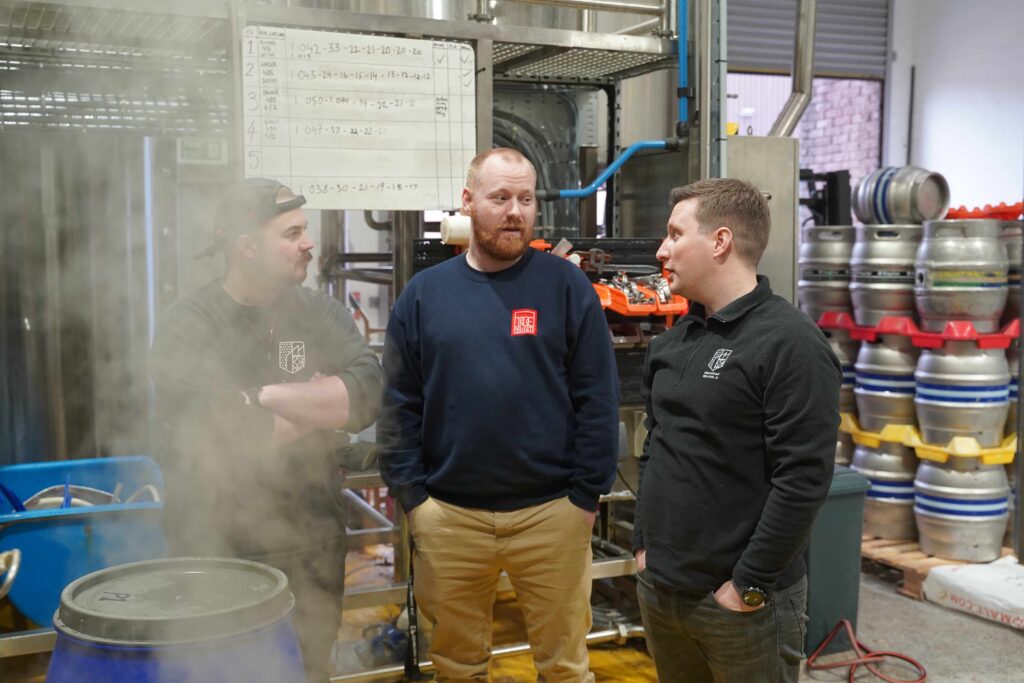
They also make sure that they don’t leave any negative impact with the waste they produce either. Its brewing waste is collected by Park Farm in Frankley and is used as livestock feed, while all of our packaging and non-brewing waste is recycled.
The brewery also likes to give back to our communities that do so much for them. Its current charity partnership is this Midlands Air Ambulance Charity, where they donate 5% of the sales of Sober Brummie to the charity and support them in as many ways as possible.
Throughout the lockdowns of 2020/21 they also wanted to do more than deliver beer to people’s doors. Important as that was, they wanted to support lockdown heroes, so many of its lockdown brews included donations to charity, such as our iconic Self Isolating Brummie which donated 5% of sales to Birmingham and Solihull Women’s Aid.

“I suppose coming from background of banking and financial services, there was corporate culture that might not have cared about the impact on others as much as it should,” he ponders.
Harwood’s journey into beer began in earnest during his undergraduate degree at The University of Cardiff. Studying Business Management, and sharing a house with “seven other lads” a revelatory visit to high-street chain Wilkinson’s opened his eyes to the ability to brew beer at home.
“I thought, hang on a second, we could be making 40 pints of beer for 10 quid or continue as we had been, buying it from the local Spar, he says. “It might not have been very good but it served a purpose!”
Following the conclusion of his studies, Harwood would enrol in an undergraduate scheme with Lloyds Banking Group. It would enable him to work across the UK, spending some 18 months in Edinburgh living in the Fountainbridge area imbibing at the city’s fine establishments.
These experiences would continue to feed into his growing love of homebrewing, where he’d upgrade his homebrew kit both in Scotland and upon his return to Birmingham, too. This love was amplified after, in 2011, he took a course at Sunderland’s Brewlab, a provider of brewing courses, training and analysis.
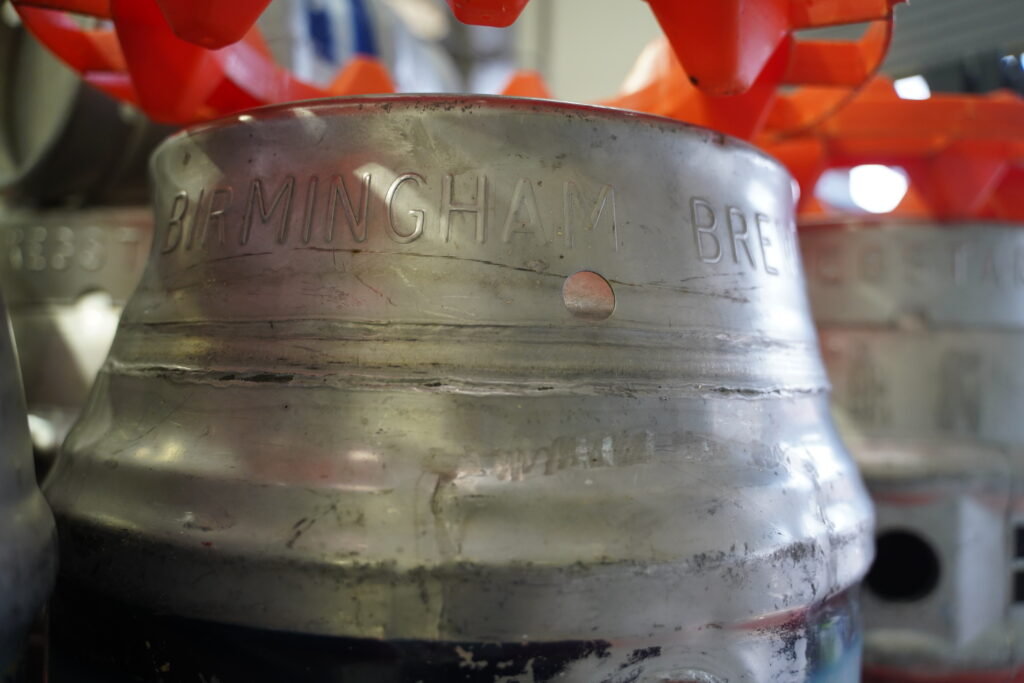
“That was a turning point for me,” he says. “It turned me more into a process brewer. Rather than wanting to brew something new each time, I became interested in getting things right. It was a really good foundation in terms of understanding process, how the kit works and the idea of continuous improvement.”
After that, every brew Harwood fired up for some 18 months was a 4% Pale Ale so he could dial in the process, recognising the impact small tweaks are having on the beer in question. “I had this huge number of dated, numbered bottles from various batches that each had their own character,” he says.
Moving through various areas of Lloyds during his seven years with the group, he felt ready for a change. The business was looking for team members to take voluntary redundancy and in Harwood they had a willing participant.
“My wife Charlotte was very supportive of the idea,” he says. “We agreed that money could be invested to help start a brewery. If it worked then great. If it didn’t then I’ll go back and get another job in banking. Thankfully, we’re still here six years later and employing a fantastic team of 15.”
After initially toying with the idea of a Birmingham city centre taproom model, Harwood soon settled on opening his brewery slightly further out of the centre and in the suburb of Stirchley. In doing so, he secured a unit on the Stirchley Trading Estate alongside a used brewkit, only several months after leaving his full-time position at Lloyds.
“It’s a big residential area but also one that was crying out for more places for people to enjoy great beer, especially cask,” he says. Despite the growth of keg, cask is still king and to this day that applies to us, too. At least 50% of what we produce is in cask with the remainder a split between keg and can.”
Support from the local community, through taproom custom and local independents meant that the brewery would hit capacity sooner than later. For three years in a row they’d brew the same amount of beer, getting as much as possible out from its maiden kit. So when the opportunity to move into a bigger premises on the same estate arose, it was something of a no-brainer.
At least 50% of what we produce is in cask,”
” Paul Harwood, Birmingham Brewing Company
“This newer premises allowed us to properly realise our taproom proposition. Not only is it bigger but it has its own entrance onto the road. Previously we had to shut at 8pm when the estate closed, which was far from ideal!” he smiles.
During 2019, the brewery would move over. Armed with its existing kit it knew it was time to upgrade but as conversations continued in earnest, COVID would hit. However, the ability to can its own beer in-house and delivery to local customers would help ensure the brewery would weather the storm and give it confidence to press ahead with its investment plans.
“We have quite a unique space here because of the high ceilings so we wanted to design kit for the space rather than buy a brewhouse and try and fit it in,” says Harwood. “We spoke to several suppliers but for us, no-one was really as flexible as TCE Projects.”
The company would go on to supply, install and commission a three vessel, skid-mounted 15 barrel brewhouse that is houses in the footprint of a 10 barrel brew house. FV Capacity is backed up by six 25HL fermenters while other kit includes CIP Skid, oversized HLT/CLT for back-to-back brews, a pilot vessel, and yeast propagation tanks.
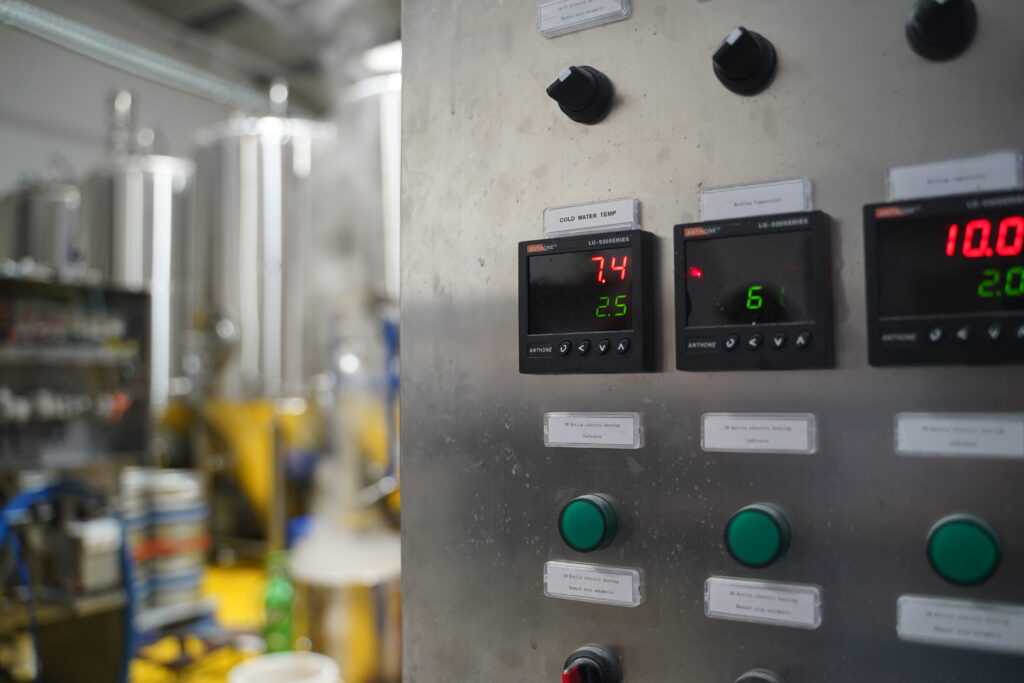
“We believe that all of our projects are bespoke in the way we approached our work here at Birmingham Brewing Company,” says Dan Rybinski, business development manager at TCE Projects. “We’ll always work one-to-one with the customer so we project manage each and every part. You don’t want the brewery owner being left to chase up contractors!
“We’re proud of the work we’ve carried out here. It’s a showcase brewery, the team are great and Paul makes a good cup of tea as well….”
Harwood adds: “A really big thing for us with this project was downtime, because we weren’t in a fortunate position where we could run the two kits next to each other. One thing TCE did was deliver the FVs several months ahead the kit. This meant we could double brew into the fermenters on our old kit ensuring we had stock to package while they were installing the new brewhouse was taking place. The whole transition was very, very smooth.”
Six years since starting out, a pandemic navigated and a site move undertaken, Harwood is proud of how far the business has come and the role is plays in the local community and beyond.
“Did I expect to have a brewery of my own during those early home brewing days? Haha, no!” he laughs. It became a dream later on in life. With my business management background I always felt I could use that knowledge working going out on my own rather than working for someone else.
“And I’m glad I did, as it has been a great journey so far.”



